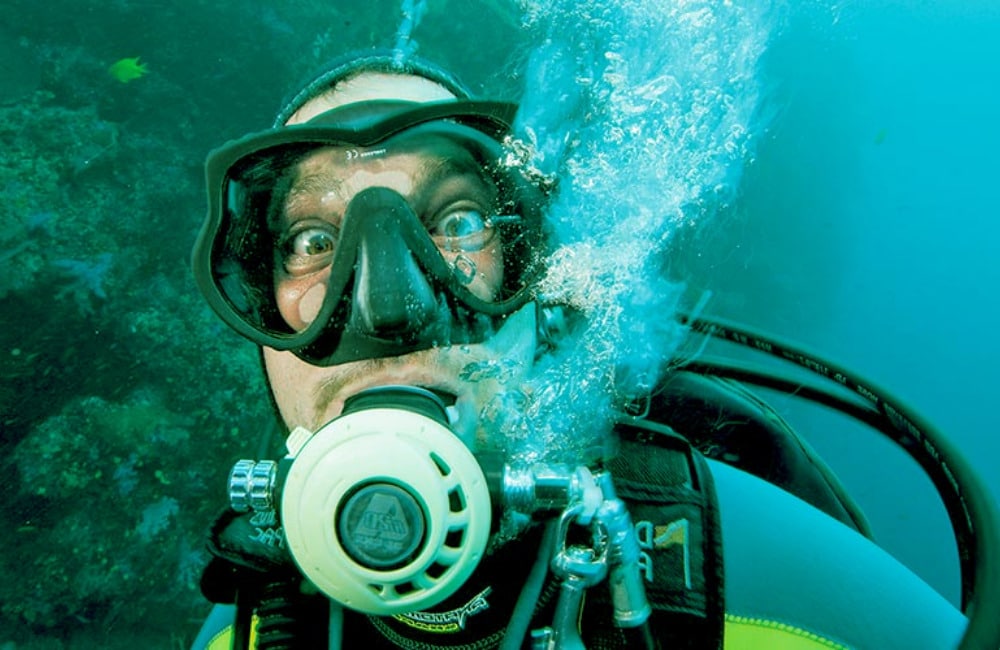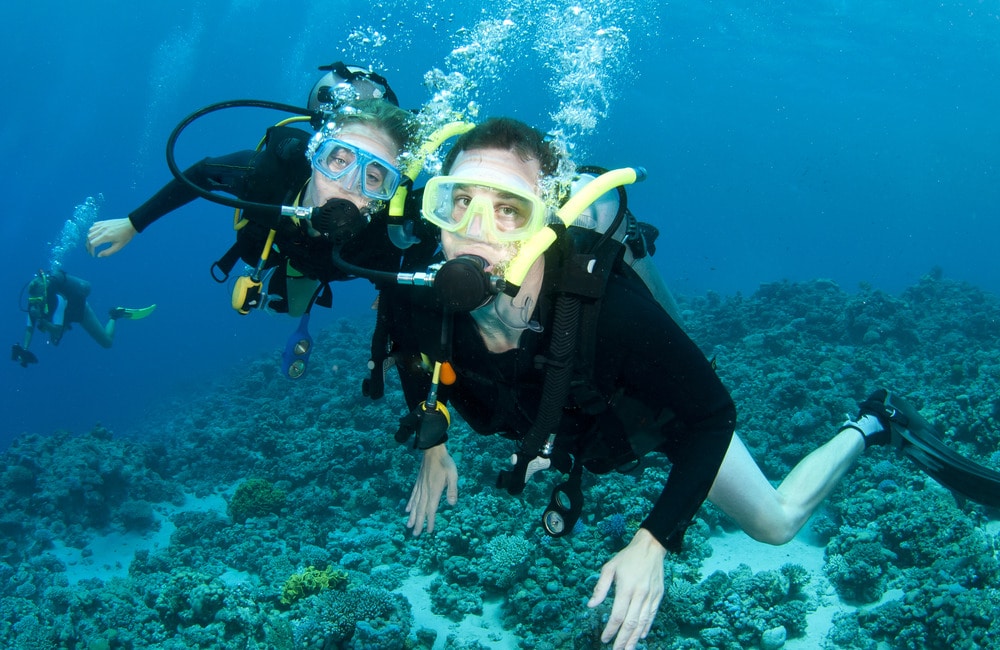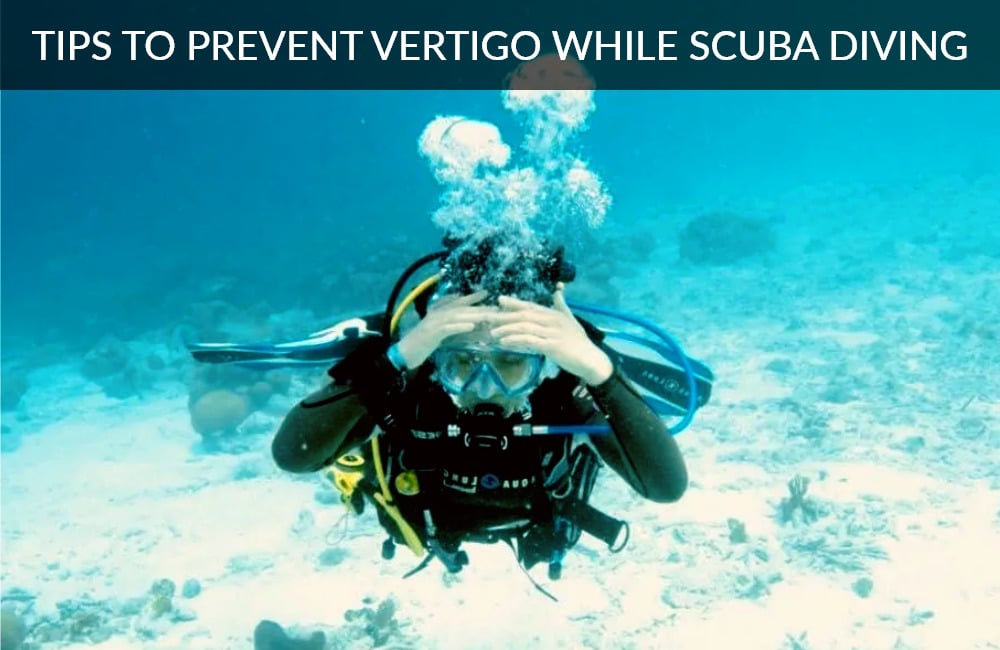Vertigo, a disorienting and sometimes debilitating condition, can be a real risk for scuba divers. Dizziness and nausea often accompany vertigo episodes making it difficult to explore marine life in the depths below sea level.
The good news is that there are some simple steps you can take before diving to minimize your chances of experiencing an episode of vertigo while out on the water. In this blog post, we’ll cover the top tips to prevent vertigo during scuba diving so you can stay safe and enjoy your time undersea!
What Is Vertigo?

Vertigo is a form of dizziness or instability caused by an inner ear disorder. It is common among adults but can also occur in children. The main symptom of vertigo is a feeling that one’s surroundings are spinning, rocking, or swaying even when you are standing still. Other symptoms may include nausea, headaches, eye movement problems, and balance problems.
To treat vertigo, doctors may recommend physical therapy to help improve the person’s balance, vestibular rehabilitation exercises to reduce dizziness and nausea, medications to reduce inflammation and stimulate nerve endings in the inner ear, or surgical procedures such as repositioning maneuvers or certain types of procedures involving the inner ear structures.
If left untreated, vertigo can cause significant disruption in day-to-day life or even lead to injury due to falls or other accidents caused by unsteadiness. Thus, it is important to consult with a doctor if vertigo symptoms are persistent and severe.
How to Prevent Vertigo While Diving?

Following are the ways to prevent vertigo while diving:
Don’t Dive When You are Unwell
Diving while unwell can lead to disastrous results, with the body’s physiology and pressure changes potentially creating a dangerous situation. It is, therefore, essential that divers never enter the underwater environment when they feel unwell in any way.
One way to minimize the risk of vertigo while diving is to increase gradually the depths one dive – start with shallow dives, then gradually descend further as you become more comfortable with the sensorial changes taking place.
This process should also be met with gradual decompression stops, ensuring that divers will surface without any ill effects from pressure changes and oxygen toxicity. With prudent precautions and careful monitoring of one’s physical state, divers can enjoy some amazing experiences safely.
Consult Your Doctor If You Have Any Underlying Conditions
If you suffer from any underlying medical condition, it is important to consult a medical professional before attempting any recreational diving activities. Vertigo is a common affliction while scuba-diving or snorkeling and can be brought on by changing pressure in the deep ocean environment.
If you have any condition that might be negatively impacted by this pressure change, such as vertigo or motion sickness, your doctor can provide advice tailored to your specific circumstances.
For example, they may recommend taking anti-motion sickness medication before diving or suggest alternative strategies, such as slow and shallow dives, to reduce vertigo risk. Following their advice is essential for preventing unpleasant effects while enjoying recreational diving activities.
Check the Gas in Your Tank Before the Dive
Checking the gas in your tank before a dive is an important safety precaution for every diver. An insufficient gas supply can lead to feelings of fatigue or lightheadedness, both of which can increase the risk of vertigo.
Further, low levels of oxygen during the dive can prevent divers from equalizing their ears and thus may induce uncomfortable sensations that could potentially trigger a vertigo episode while underwater. It is, therefore, imperative that divers ensure they have an adequate air supply in their tanks before embarking on a dive.
To maximize safety, it is recommended to test the tank with a pressure gauge and always uses fresh cylinders when going out on a dive. By following such procedures, divers can stay safe at depths and enjoy underwater excursions without any worries about vertigo.
Equalize Air Spaces Regularly
While diving, it is important to be mindful of equalizing air spaces regularly. Doing so can help prevent uncomfortable symptoms like dizziness and vertigo triggered by the varying atmospheric pressure underwater.
The sinuses are particularly sensitive to changes in pressure, so divers should make a point at regular intervals to equalize the pressure between their ears and nose to the external environment of water around them.
If you experience any sizable difference in pressure levels during your dive, ensure you stop for a moment and take whatever steps necessary to level out before continuing. Taking care to do this can make for a more comfortable underwater experience and promote safety among divers.
Find Something to Focus on to Help Your Brain Stay Oriented
To help calm the brain and keep your orientation, focus on something stationary during a dive. An object you fixed your eye upon before entering the water, such as a direction flag or ship mast, is ideal for merging with and allowing your brain to understand where you are in space.
Keeping an ultimate goal in mind during a dive, such as finding a certain point or destination, can also help renew focus during the journey, further calming the senses and avoiding vertigo-related issues!
What to Do if You Experience Vertigo When Diving?

Below are the steps that you can follow if you experience vertigo while diving:
Stop, Breathe, Think, and Act
Vertigo can be a scary experience while diving, but the best way to deal with it is by taking a moment to Stop, Breathe, Think, and Act. Stopping your descent and becoming still helps to calm your mind, allowing you to regain rational thought.
Taking some deep breaths through your nose and out through your mouth will help to reduce anxiety and panic feelings associated with vertigo. Thinking clearly and objectively about what is going on is critical in order to make sound decisions that are not influenced by fear.
Finally, taking decisive action based on the given situation will help bring you back into control of the dive. Utilizing the Stop, Breathe, Think, Act method can reduce the duration of vertigo episodes as well as reduce their severity.
Establish Where You Are and Maintain Your Position
Experiencing vertigo while diving can be disorienting and a cause for concern. The best way to regain your bearings is to stop the dive and establish or reestablish where you are in the environment.
Take a moment to orient yourself using your vision, buoyancy control, motor skills, navigation skills, and habitat cues; any diagnostics from instruments should also be used if available.
Once oriented, it is important to then maintain your position as it will give you more time to assess the situation without panicking and making matters worse. Remember that when dealing with this type of situation, breathing slowly and deeply and controlling your thoughts are essential.
Signal Your Buddy for Help
One precaution divers can take to ensure their safety is to signal their buddy when they are feeling disoriented. If one diver signals that they have vertigo, the buddy should respond immediately using an alternate signaling method, usually defined by each dive team prior to descent.
In this way, both divers will provide assistance to each other in order to ascend safely from the dive site and avoid possible injury. Although a wonderful experience, scuba diving requires knowledge of the risks involved and attention paid so that accidents are avoided; signaling your buddy for help if you experience vertigo is one of these important safeguards against harm.
Keep Your Regulator in Your Mouth
If you keep your regulator in your mouth, it can help to reduce the feeling of disorientation. This is because having the regulator in your mouth helps to anchor your senses and lets you properly access important information such as depth, time, and gas levels.
With this information on hand, you will be able to take steps towards regaining control of your dive and recovering from the effects of vertigo. Doing this will ensure that you have a safe and enjoyable dive.
If Symptoms Persist, Abort the Dive
If symptoms such as vertigo occur while diving, the best resolution would be to abort the dive until the issue can be addressed and resolved. Vertigo and other issues can come on suddenly and, if left untreated, could lead to a hazardous outcome not only for you but for your companions as well.
All divers should be aware that safety will always take first priority, and if worrisome signs are present, they should abort their dive without hesitation in order to protect themselves and others.
Conclusion
In conclusion, the feeling of vertigo can be not only uncomfortable but also dangerous for scuba divers. It is essential to take preventive measures to ensure a safe and enjoyable experience. Remember to adjust ear pressure when taking off or landing an airplane, even before you plan a diving trip.
You also should dive slowly and gradually during your descent, which can help avoid abrupt changes in pressure that can trigger vertigo symptoms. Before you go deeper, acclimate yourself with a few minutes of shallow water breath-hold dives each day until you reach the desired depth.
Proper hydration is another important step, as dehydration can increase the chances of getting vertigo. Lastly, it is recommended to avoid consuming alcoholic beverages prior to diving and make sure to get enough rest each night while on your trip.
By following these tips and being mindful of any changes in pressure, scuba divers will be better protected from experiencing unwanted vertigo suspicions underwater.
